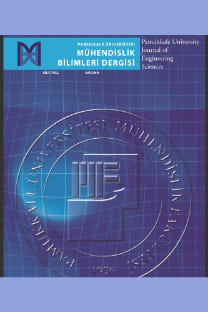Zaman pencereli toplama ve dağıtım problemi için kısıt programlama yaklaşımı
Kısıt programlama, Toplama ve dağıtım problemi, Zaman pencereleri
A constraint programming approach for the pickup and delivery problem with time windows
___
- Hernández‐Pérez H, Salazar‐González JJ. “The multi‐commodity pickup‐and‐delivery traveling salesman problem”. Networks, 63(1), 46-59, 2014.
- Ho SC, Szeto WY. “GRASP with path relinking for the selective pickup and delivery problem”. Expert Systems with Applications, 51, 14-25, 2016.
- Lenstra JK, Desroches M, Savelbergh MWP, Soumis F. “Vehicle routing with time windows: optimization and approximation”. Vehicle routing: Methods and studies, CWI Report, 65-84, 1988.
- Desrosiers J, Dumas Y, Solomon MM, Soumis F. “Time constrained routing and scheduling”. Handbooks in operations research and management science, 8, 35-139, 1995.
- Solomon MM, Desrosiers J. “Survey paper: time window constrained routing and scheduling problems”. Transportation Science, 22(1), 1-13, 1988.
- Savelsbergh MW, Sol M. “The general pickup and delivery problem”. Transportation Science, 29(1), 17-29, 1995.
- Toth P, Vigo D. The vehicle routing problem. Philadelphia, USA, SIAM, 2002.
- Li H, Lim A. “A metaheuristic for the pickup and delivery problem with time windows”. International Journal on Artificial Intelligence Tools, 12(2), 173-186, 2003.
- Bent R, Van Hentenryck P. “A two-stage hybrid algorithm for pickup and delivery vehicle routing problems with time windows”. Computers and Operations Research, 33(4), 875-893, 2006.
- Ropke S, Pisinger D. “An adaptive large neighborhood search heuristic for the pickup and delivery problem with time windows”. Transportation Science, 40(4), 455-472, (2006)..
- Parragh SN, Doerner KF, Hartl RF. “A survey on pickup and delivery models part ii: Transportation between pickup and delivery places”. Journal für Betriebswirtschaft, 58(2), 81-117, 2008.
- Nagata Y, Kobayashi S. “Guided ejection search for the pickup and delivery problem with time windows”. Evolutionary Computation in Combinatorial Optimization, Istanbul, Turkey, 7-9 April 2010.
- Nalepa J, Blocho M. “Enhanced guided ejection search for the pickup and delivery problem with time windows”. Intelligent Information and Database Systems, Da Nang, Vietnam, 14–16 March 2016.
- Xu H, Chen ZL, Rajagopal S, Arunapuram S. “Solving a practical pickup and delivery problem”. Transportation Science, 37(3), 347-364, 2003.
- Qu Y, Bard JF. “The heterogeneous pickup and delivery problem with configurable vehicle capacity”. Transportation Research Part C: Emerging Technologies, 32, 1-20, 2013.
- Bettinelli A, Ceselli A, Righini G. “A branch-and-price algorithm for the multi-depot heterogeneous-fleet pickup and delivery problem with soft time windows”. Mathematical Programming Computation, 6(2), 171-197, 2014.
- Männel D, Bortfeldt A. “A hybrid algorithm for the vehicle routing problem with pickup and delivery and three-dimensional loading constraints”. European Journal of Operational Research, 254(3), 840-858, 2016.
- Tchoupo MN, Yalaoui A, Amodeo L, Yalaoui F, Flori P, Lutz F. “An efficient column-generation algorithm for a new fleet size and mix pickup and delivery problem with Time windows”. IFAC-PapersOnLine, 51(9), 440-445, 2018.
- Györgyi P, Kis T. “A probabilistic approach to pickup and delivery problems with time window uncertainty”. European Journal of Operational Research, 274(3), 909-923, 2019.
- Lu EHC, Yang YW. “A hybrid route planning approach for logistics with pickup and delivery”. Expert Systems with Applications, 118, 482-492, 2019.
- Ropke S, Cordeau JF, Laporte G. “Models and branch‐and‐cut algorithms for pickup and delivery problems with time windows”. Networks: An International Journal, 49(4), 258-272, 2007.
- Rais A, Alvelos F, Carvalho MS. “New mixed integer-programming model for the pickup-and-delivery problem with transshipment”. European Journal of Operational Research, 235(3), 530-539, 2014.
- Cordeau JF. “A branch-and-cut algorithm for the dial-a-ride problem”. Operations Research, 54(3), 573-586, 2006.
- Rossi F, Van Beek P, Walsh T. “Constraint programming”. Foundations of Artificial Intelligence, 3, 181-211, 2008.
- Gedik R, Kirac E, Milburn AB, Rainwater C. “A constraint programming approach for the team orienteering problem with time windows”. Computers and Industrial Engineering, 107, 178-195, 2017.
- Rahimian E, Akartunalı K, Levine J. “A hybrid integer and constraint programming approach to solve nurse rostering problems”. Computers and Operations Research, 82, 83-94, 2017.
- Hojabri H, Gendreau M, Potvin JY, Rousseau LM. “Large neighborhood search with constraint programming for a vehicle routing problem with synchronization constraints”. Computers and Operations Research, 92, 87-97, 2018.
- Laborie P, Rogerie J, Shaw P, Vilím P. “IBM ILOG CP optimizer for scheduling”. Constraints, 23(2), 210-250, 2018.
- IBM Knowledge Center. “IBM ILOG CPLEX Optimization Studio V12.8.0 documentation”. https://www.ibm.com/support/knowledgecenter/en/SSSA5P_12.8.0/ilog.odms.studio.help/Optimization_Studio/topics/COS_home.html (09.06.2019).
- Laborie P, Rogerie J. “Reasoning with conditional time-intervals”. Twenty-First International FLAIRS Conference, Florida, USA, 15–17 May 2008.
- Laborie P, Rogerie J, Shaw P, Vilím P. “Reasoning with conditional time intervals. Part II: An algebraical model for resources”. Twenty-Second International FLAIRS Conference, Florida, USA, 15–17 May 2009.
- Solomon MM. “Algorithms for the vehicle routing and scheduling problems with time window constraints”. Operations Research, 35(2), 254–265, 1987.
- ISSN: 1300-7009
- Başlangıç: 1995
- Yayıncı: PAMUKKALE ÜNİVERSİTESİ
Fabrika içi Milk Run rotalama için bir matematiksel model
Süt toplama problemi için bütünleşik bir matematiksel model
Olcay POLAT, Can Berk KALAYCI, Bilge BİLGEN, Duygu TOPALOĞLU
Pannita CHAİTANGJİT, Pornthipa ONGKUNARUK
Depo yeri seçiminde kullanılan başarı faktörleri ve yöntemler üzerine bir literatür araştırması
Ramazan Eyüp GERGİN, İskender PEKER
Zaman pencereli toplama ve dağıtım problemi için kısıt programlama yaklaşımı
Mustafa KÜÇÜK, Şeyda TOPALOĞLU YILDIZ
Görkem GÜLHAN, Soner HALDENBİLEN, Halim CEYLAN
İstanbul’da elektrikli araç şarj istasyonlarının konumlandırılması için bir model
Büşra Gülnihan DAŞÇIOĞLU, Gülfem TUZKAYA, Hüseyin Selçuk KILIÇ
Akıllı kentsel lojistik çözümlerinin bulanık ÇKKV yöntemleri ile değerlendirilmesi
Farklı karbon emisyon politikaları altında sağlam bir kapalı döngü tedarik zinciri şebeke tasarımı
Murtadha ALDOUKHİ, Surendra GUPTA
Hizmet lojistiğinde iş atama ve rotalama politikaları tasarımı
Zehra DÜZGİT, Ayhan Özgür TOY, Simge ÇOBAN, Zeynep ALİBAŞOĞLU, Özlem TOK ÖZKESKİN, Mert KARAKAYA, Yücel BAYRAK
